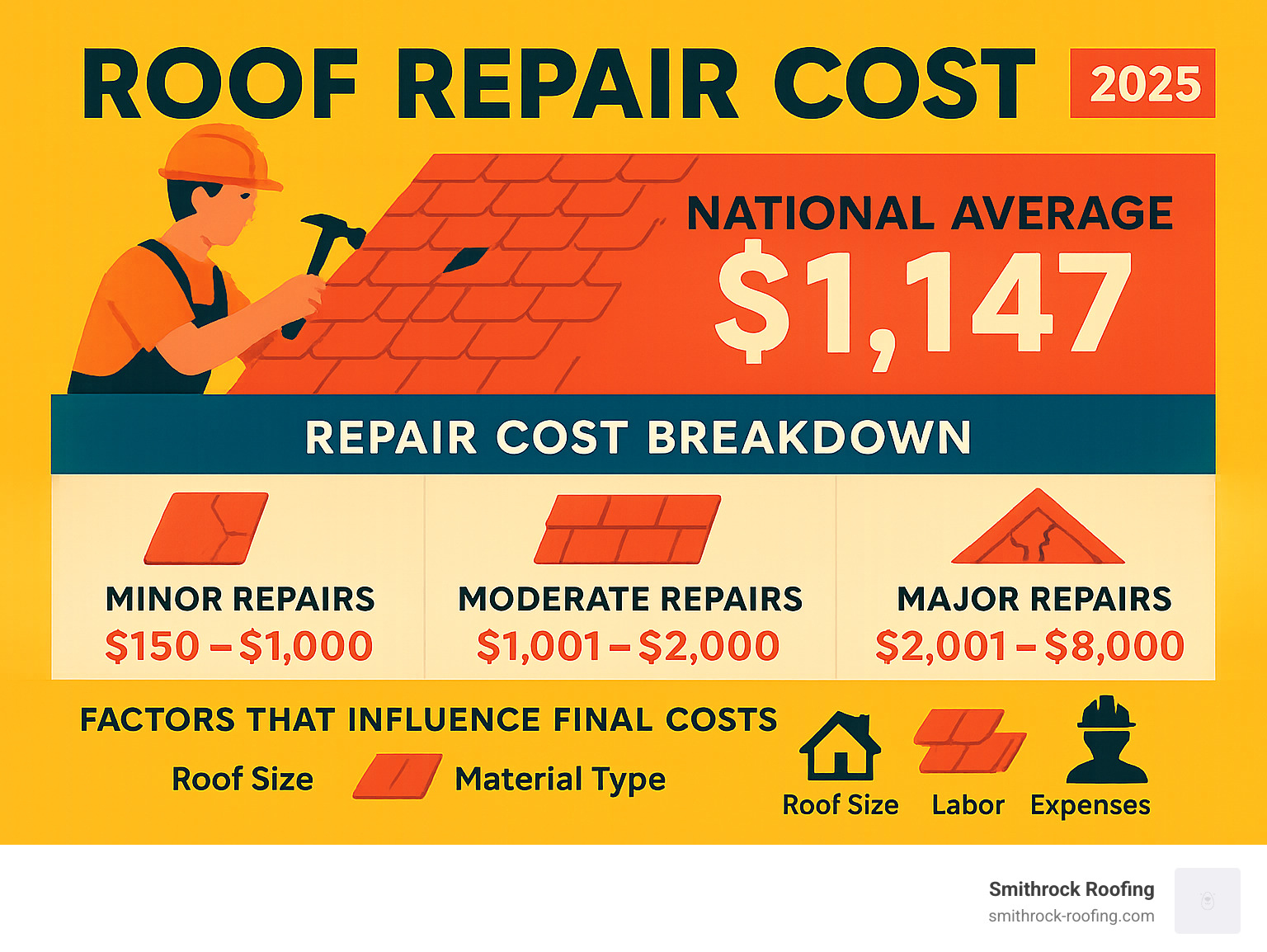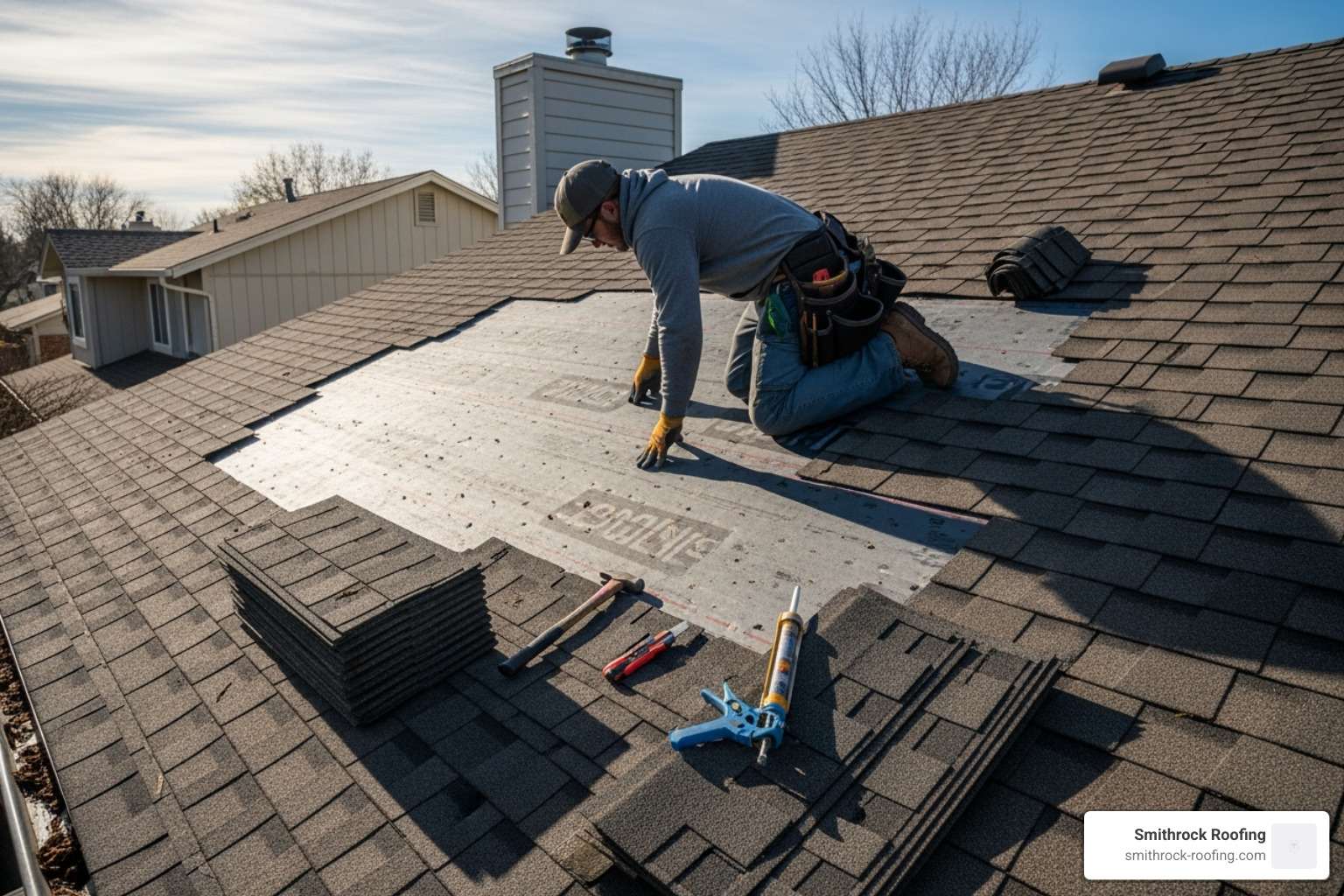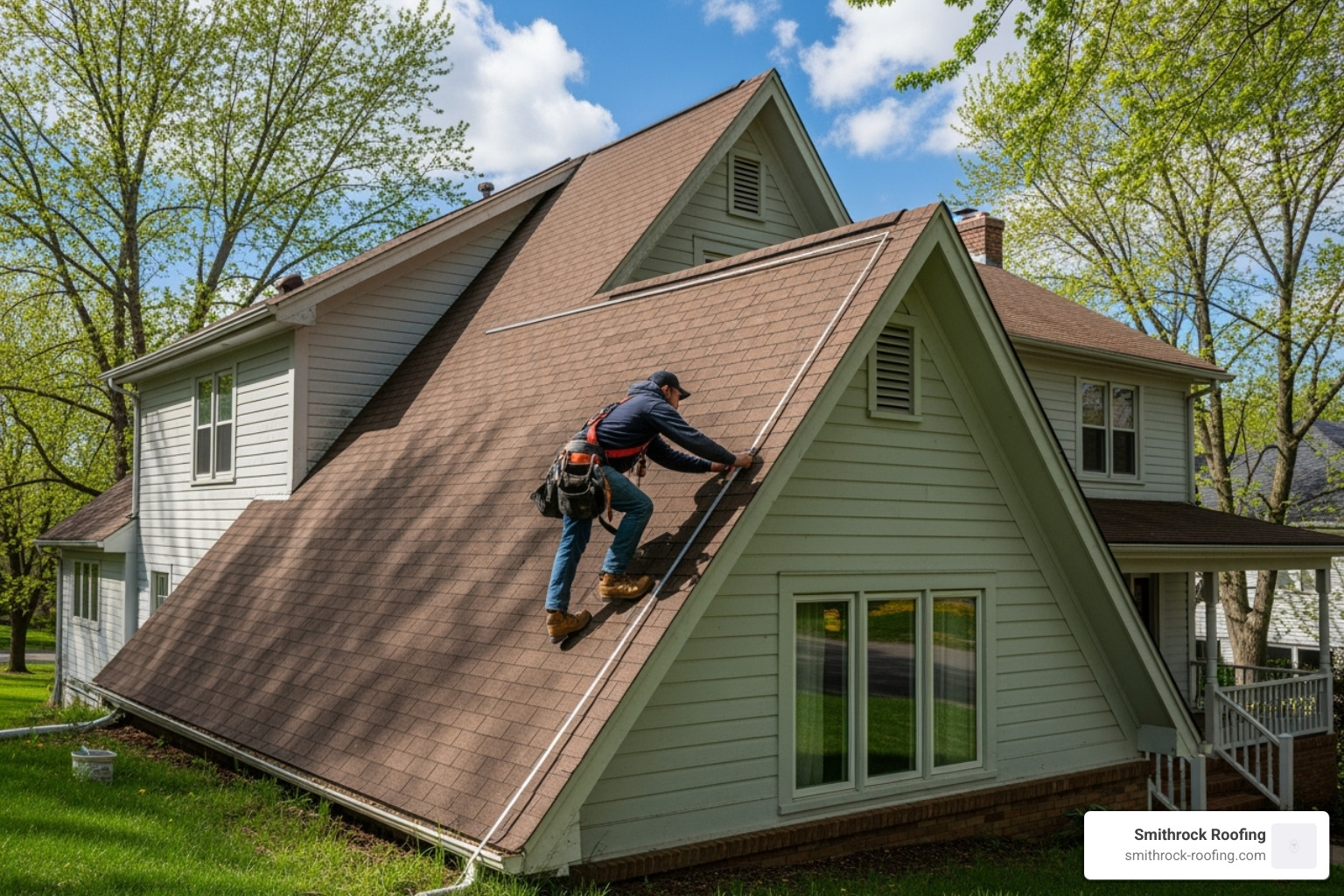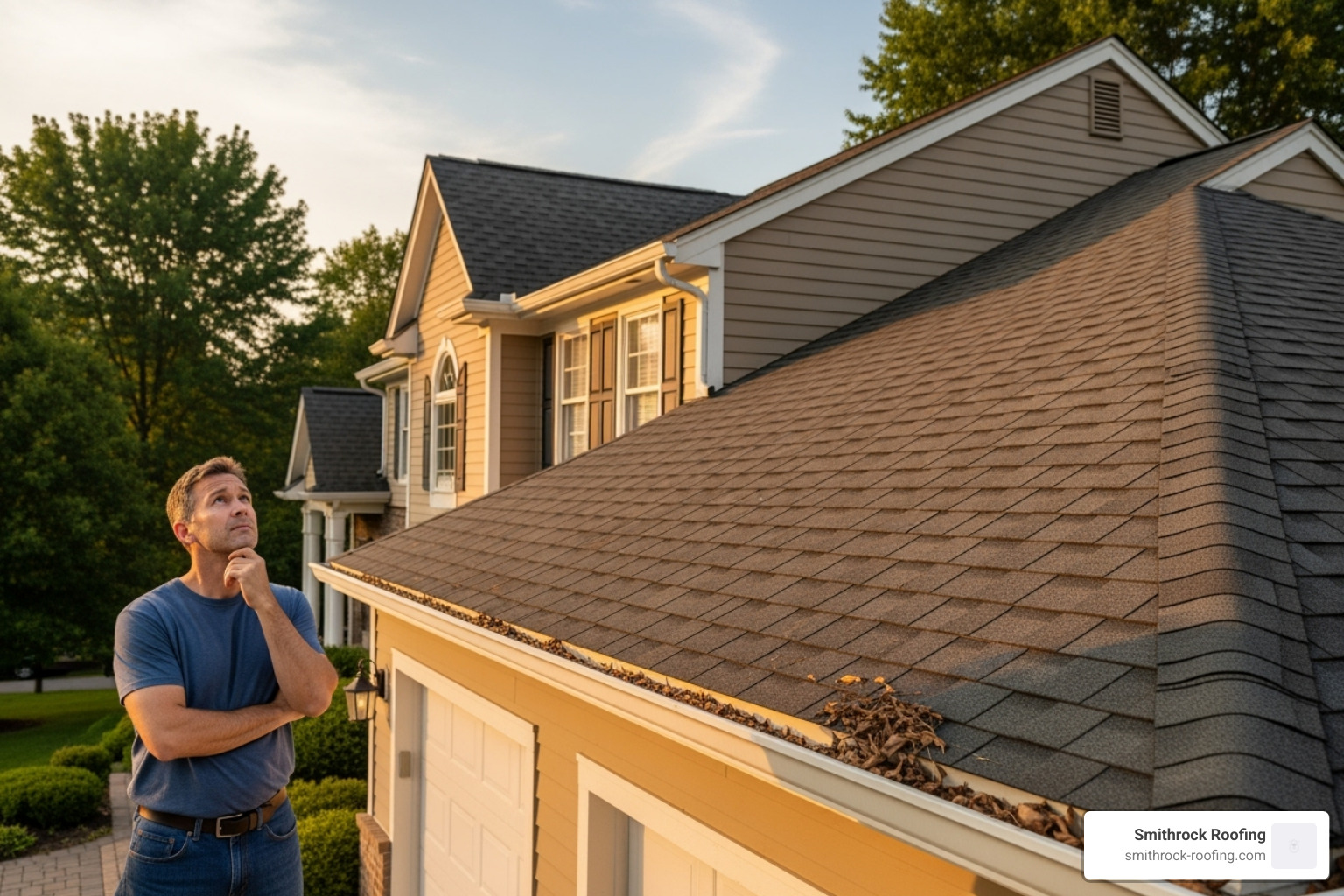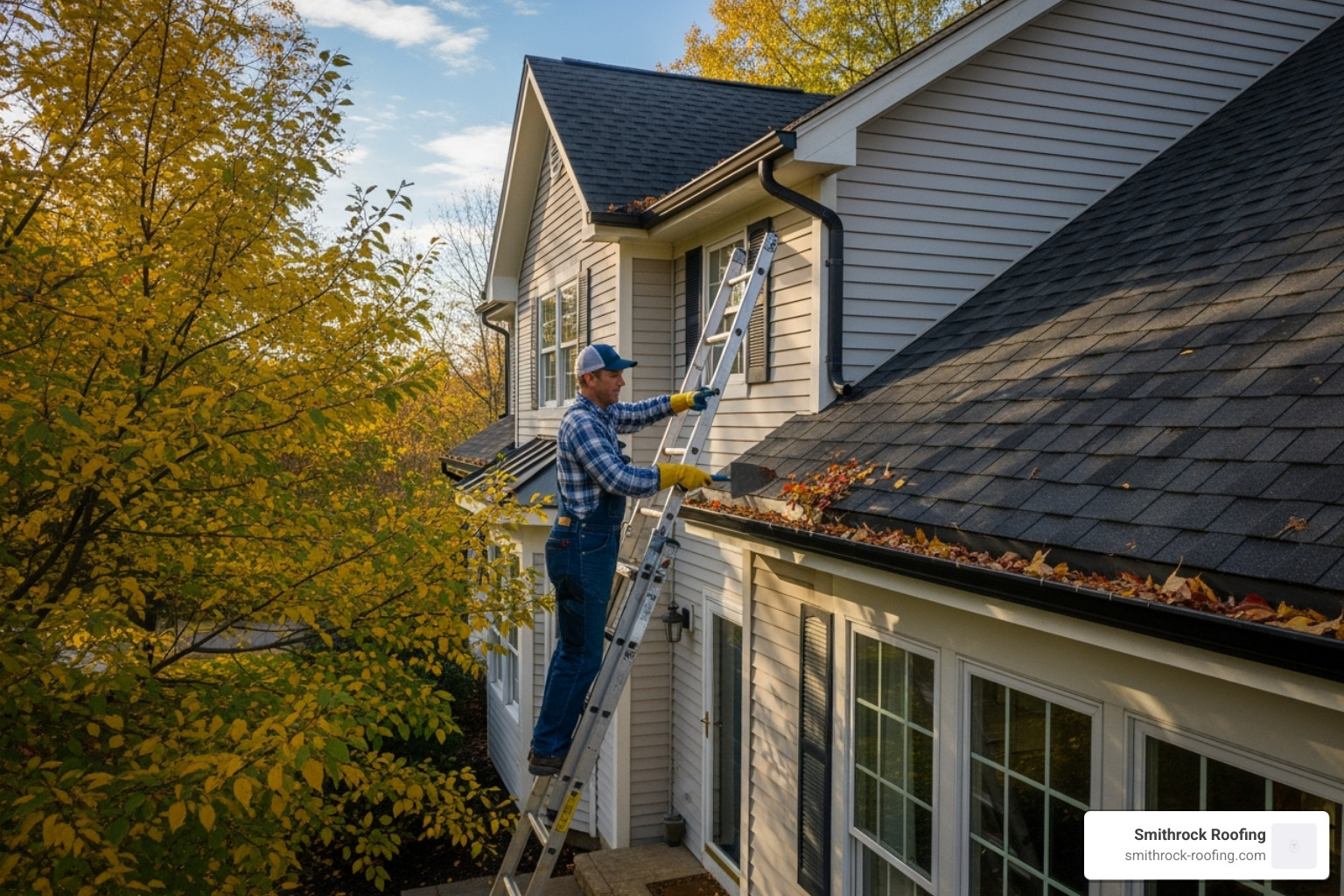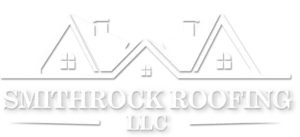Roof Repair Cost: 101 Smart Savings
Understanding Roof Repair Costs: What Every Homeowner Should Know
Roof repair cost is a critical expense for homeowners. Nationally, repairs average $1,147, with a typical range of $392 to $1,913, depending on the job’s complexity.
Quick Cost Overview:
- Minor repairs: $150-$1,000 (e.g., small leaks, a few missing shingles)
- Moderate repairs: $1,001-$2,000 (e.g., flashing replacement, moderate damage)
- Major repairs: $2,001-$8,000 (e.g., structural issues, extensive damage)
- Emergency services: Add $100-$300 to base costs
When your roof shows signs of damage, time is money. A few missing shingles can quickly escalate into major structural issues if ignored. Water damage can spread from the roof to your attic, walls, and even the foundation.
The good news is that most roof repairs are manageable expenses when caught early. Understanding what drives these costs helps you make informed decisions. As one customer wisely noted, it’s better to invest in a quality repair now than to pay to fix it twice. “I am way too poor to buy cheap,” he said, capturing the importance of doing the job right the first time.
I’m Jordan Smith, and with over 15 years in exterior construction, I’ve helped homeowners steer roof repair cost decisions. The right repair at the right time can extend your roof’s life by years while protecting your home’s value.

Roof repair cost terms to remember:
Breaking Down the Average Roof Repair Cost
When your roof needs attention, the first question is always about cost. The answer varies because every repair is unique.

The national average cost for roof repairs is $1,147, but the typical price range is $392 to $1,913. This wide range reflects the different types of damage a roof can sustain.
- Minor repairs ($150 – $1,000): These are simple fixes, like replacing a few shingles that blew off in a storm or sealing a small leak.
- Moderate repairs ($1,001 – $2,000): This category includes replacing flashing around a chimney or repairing a larger section of damaged shingles.
- Major repairs ($2,001 – $8,000+): These involve serious problems like structural issues or extensive water damage to the roof’s underlying support system.
- Emergency service fees (add $100 – $300): For urgent, after-hours service, like when water is actively leaking into your home, you can call an Emergency Roofer, but expect to pay a premium for the immediate response.
Estimating Your Roof Repair Cost by Project Scope
The specific problem dictates the final roof repair cost. Here are some common issues and their typical price points:
- Hole repair ($100 – $1,000): Costs depend on the hole’s size and the roofing material. Patching asphalt shingles is less expensive than repairing metal or tile.
- Leaking roof ($400 – $2,500): The main challenge is locating the entry point of the leak, which may be far from where the water damage appears inside. A professional may use techniques like a controlled water test, where they isolate different areas of the roof with a hose to pinpoint the source, or even infrared thermography to detect hidden moisture in the roof structure.
- Sagging roof ($1,500 – $7,000): This is a serious structural issue that requires immediate attention. It can be caused by prolonged water damage that has rotted the decking and joists, undersized or improperly spaced rafters, or the sheer weight of multiple shingle layers from previous roofing jobs. Costs depend on whether rafters, trusses, or other supports need replacement.
- Hail damage ($700 – $4,000): Hail can knock granules off shingles or puncture the roofing material. Insurance adjusters often look for a certain number of hail impacts within a 10×10 foot “test square” to determine if the damage is significant enough to warrant a full replacement. For more on storm-related issues, see our guide on Storm Damage Roof Repair in Winston Salem: What Homeowners Should Know.
- Shingle replacement ($50 – $800): The cost varies based on the type and number of shingles. A few basic shingles are cheap, while a large section of architectural shingles costs more.
- Structural repairs ($500 – $5,000): The most complex repairs involve damage to the underlying rafters, trusses, or decking. This can involve sistering new rafters alongside damaged ones, replacing entire sections of rotted roof decking (the plywood or OSB sheathing), or reinforcing trusses to restore the roof’s integrity. These often require specialized expertise and permits.
Understanding Additional Costs and Fees
Several other expenses can affect your final bill. It’s good to be aware of these potential costs:
- Permits ($75 – $250): Required for certain repairs to ensure they meet local building codes. These permits ensure the work is done to current safety and building standards, protecting both you and future owners of the home.
- Inspections ($100 – $600): A professional inspection helps identify the root cause of problems and is critical if you’re selling your home. This is not just a quick look; a thorough inspection involves checking the attic for signs of leaks, ventilation issues, and structural integrity, as well as a detailed examination of the roof surface, flashing, and gutters. Learn more at Roof Inspection Selling House.
- Debris disposal ($1 – $5 per sq. ft.): The cost to remove and dispose of old roofing materials is usually included in the quote.
- Scaffolding (starts at $800 – $1,000): Necessary for safety and access on multi-story homes or hard-to-reach roofs.
- Emergency call-out fees: A premium of several hundred dollars for immediate, after-hours service.
Key Factors That Influence Your Final Bill
No two roof repairs cost the same. The final bill is a mix of several factors, from the size of your roof to the time of year.

- Roof size: Larger roofs require more materials and labor, increasing the cost. Repairs are often quoted per square foot or per “square” (100 sq. ft.).
- Roof pitch: A steep roof (over an 8/12 pitch) requires extra safety equipment like harnesses, roof jacks, and sometimes even scaffolding, and slower work, which can add $1,000 to $3,000 to the bill.
- Roof complexity: Features like dormers, skylights, chimneys, and valleys require intricate flashing and custom work, driving up labor costs.
- Accessibility: If your roof is hard to access due to landscaping or multiple stories, the need for extra time and equipment will increase the cost.
- Geographic location: Labor rates and material costs vary by region. Coastal areas may see higher costs due to the need for salt- and wind-resistant materials, while areas with heavy snowfall require robust structures. Local permit fees in areas like Winston-Salem or High Point will also affect the price.
- Time of year: Spring and summer are peak seasons with higher demand and premium rates. Scheduling non-urgent repairs in the off-season (late fall or winter) can sometimes lead to better pricing.
- Labor costs: This is often the largest part of the bill, typically 60% or more. The national average hourly wage for roofers is around $24.96 but varies with experience and job complexity.
- Roof age: Older roofs are more challenging. Materials can be brittle or discontinued, and a small repair may uncover other age-related issues, increasing the scope of the project.
How Material Choice Affects Your Roof Repair Cost
The type of material on your roof is one of the biggest factors in your roof repair cost. Our Roof Repair Services cover all common materials, and we understand how each impacts cost and complexity.
| Material Type | Average Repair Cost (Typical Range) | Average Lifespan | Cost per Square Foot (Replacement) |
|---|
| Asphalt Shingles | $875 ($50–$800 for shingle repair) | 20–30 years | $4.25–$8.25 |
| Metal | $1,600 ($5.50–$17.05/sq ft) | 40–70 years | $8–$30 |
| Slate | $1,550 ($12–$22/sq ft) | 75–200 years | $23–$38 |
| Clay/Concrete Tile | $1,000 (Clay); $2,400 (Concrete) | 50–100 years | $8.50–$24.75 |
| Wood Shakes | $750 ($8–$14.30/sq ft) | 30–50 years | $4–$14 |
| Flat Roofing | $400 ($5.50–$7.50/sq ft) | 10–25 years | $2.50–$9 |
Note: Repair costs are averages for common issues. Replacement costs are for full installation. Actual costs may vary.
- Asphalt shingles: Most common and budget-friendly to repair. Repair is straightforward, but matching the color and weathering of older shingles can be a challenge.
- Metal roofing: More expensive to repair due to specialized skills and precision required. Repairs can range from re-coating surfaces and sealing seams to replacing entire damaged panels, which requires specialized tools for cutting and crimping.
- Slate: A luxury material requiring expert craftsmanship and specialized tools like a slate ripper and hammer. Each broken slate must be carefully removed and replaced without damaging the surrounding tiles.
- Clay and concrete tiles: Durable, but the tiles themselves can be brittle and crack under impact or foot traffic. Repairs require care to avoid a chain reaction of breaking adjacent tiles.
- Wood shakes: Repairs require knowledge of wood species, weathering patterns, and proper fastening techniques to prevent splitting.
- Flat roofing: Requires a deep understanding of different membrane systems (TPO, EPDM, PVC) and specialized techniques for heat-welding seams or applying liquid sealants to ensure a waterproof finish.
Common Repair Costs by Roof Feature
Your roof is a system of parts, each with its own repair costs.
- Flashing repair ($200 – $800): Flashing seals joints around chimneys ($200-$500) and skylights ($300-$800). Failed flashing is a common cause of leaks.
- Soffit and fascia repair ($600 – $6,000): Protects roof edges and provides attic ventilation. Rot can spread, making repairs extensive and costly.
- Roof vent repair ($75 – $250): A relatively inexpensive but vital fix to prevent leaks from cracked pipe boots or damaged vents.
- Gutter-related damage ($180 – $560 for repair): Clogged or damaged gutters can cause water to back up and damage the fascia, soffit, and roof deck.
- Dormer repair ($250 – $1,000): Dormers have their own complex roofing systems, making repairs more intricate.
- Valley repair ($300 – $1,000): Valleys channel large amounts of water and are prone to wear. Repairs often involve replacing underlying waterproof membranes.
Repair or Replace? Making the Right Financial Decision
Homeowners often face a tough choice: repair the roof or replace it entirely? While there’s no single answer, certain guidelines can help you make the best financial decision when faced with a high roof repair cost.

For a relatively young roof with minor, localized damage, a simple repair is the most cost-effective solution. However, if repairs are frequent or the damage is widespread, the costs can add up. A common industry guideline is the 30% rule: if more than 30% of your roof needs work, replacement is often the smarter financial choice.
Consider these factors:
- Age of your roof: An asphalt shingle roof is typically replaced after 20-25 years. If your roof is nearing the end of its lifespan, investing in major repairs may not be wise.
- Extent of damage: Surface-level issues like a few cracked shingles are repairable. But if damage has reached the underlayment or structural supports, replacement is often better.
- Frequency of repairs: If you’re constantly calling a roofer for small fixes, it may signal a systemic failure that only a replacement can solve.
- Long-term investment: A new roof improves energy efficiency, increases property value, and offers peace of mind. For a deeper dive, see our guide on Roof Repair vs Replacement in Winston Salem: What Homeowners Need to Know.
Signs Your Roof Needs Attention
Catching problems early can save you from a much higher roof repair cost. Look for these warning signs:
- Curling or cracked shingles: Indicates age and weather damage.
- Missing granules: Look for bald spots on shingles or granules in your gutters.
- Moss or algae growth: Traps moisture and accelerates deterioration.
- Water stains on ceilings: A clear sign that water is getting inside.
- Sagging roof deck: A structural emergency that requires immediate professional help.
- Damaged flashing: Look for bent, rusted, or loose flashing around chimneys and vents.
- Clogged gutters: Can cause water to back up and damage the roof edge.
Lifespan of Common Roofing Materials
Knowing your roof’s expected lifespan helps you decide whether to repair or replace it.
- Asphalt shingles: 20-30 years. If your roof is over 20 years old and has problems, replacement is often the best option.
- Metal roofs: 40-70 years. These are very durable, and repairs are usually worthwhile.
- Slate tiles: 75-200 years. With incredible longevity, slate is almost always repaired rather than replaced.
- Wood shakes: 30-50 years. The decision depends on the extent of rot or damage.
- Clay and concrete tiles: 50-100 years. These long-lasting materials are typically repaired by replacing individual broken tiles.
If your roof is nearing the end of its expected lifespan and requires frequent repairs, replacement is often the smarter long-term financial move.
Smart Ways for Homeowners to Save Money
No one wants to overpay for roof repairs. Fortunately, there are several ways to manage your roof repair cost without sacrificing quality.

The most effective strategy is proactive maintenance. Fixing a loose shingle might cost $50, but waiting until it causes a major leak can cost thousands.
- Perform DIY inspections: Use binoculars to inspect your roof from the ground twice a year and after major storms. Look for missing shingles, damaged flashing, or debris.
- Get multiple quotes: Comparing at least three estimates is essential. Request a detailed Roof Estimate that breaks down material and labor costs to make an informed comparison. When comparing quotes, don’t just look at the bottom line. A quality estimate should be a detailed document that specifies the exact materials to be used (including brand names), a clear scope of work, labor costs, debris disposal fees, and warranty information. Vague, one-line quotes are a red flag. A transparent contractor will break down the costs so you know exactly what you’re paying for.
- Check your insurance coverage: Homeowner’s insurance often covers damage from sudden events like storms or fallen trees, but not gradual wear and tear. Contact your insurer promptly after a potential incident. Document everything. Take photos and videos of the damage immediately after it occurs. Keep a log of all communication with your insurance company. When the adjuster visits, it’s often beneficial to have your chosen roofing contractor present to ensure all damage is properly identified and assessed.
- Time your repairs: If the repair isn’t urgent, scheduling it during the off-season (late fall or winter) may result in more competitive pricing. However, do not delay fixing an active leak.
- Bundle your exterior projects: If you know your gutters are old or you’re considering new siding, ask your contractor if they offer these services. Bundling multiple projects with one company can often lead to a package discount and ensures a cohesive look and installation for your home’s exterior.
- Look into assistance programs: For homeowners facing financial hardship, government programs may be available. The Department of Housing and Urban Development and local agencies sometimes offer assistance for essential home repairs.
The cheapest roof repair cost isn’t always the best value. A quality repair that lasts is a better investment than a cheap fix that needs to be redone.
Frequently Asked Questions about Roof Repair Costs
As a roofing professional, I get a lot of questions about roof repair cost. Here are answers to some of the most common concerns.
How long does a typical roof repair take?
The timeline depends entirely on the scope of work:
- Minor repairs (e.g., replacing a few shingles, sealing a vent): Usually takes a few hours.
- Moderate repairs (e.g., replacing flashing, fixing a section of decking): Typically takes one full day, sometimes two.
- Major repairs (e.g., structural work, extensive storm damage): Can take several days to a full week.
Factors like bad weather, roof complexity, and material availability can also cause delays.
While the DIY spirit is admirable, most roof repairs should be left to professionals. The safety risks are significant, as falls from roofs are a leading cause of serious injury. There are other key considerations:
- Potential for more damage: An inexperienced repair can easily cause new leaks or damage surrounding materials, leading to a higher final roof repair cost.
- Warranty issues: DIY repairs can void both material and workmanship warranties from the original installer.
When should you call a professional? For anything beyond a very minor, easily accessible fix, it’s always best to call a licensed and insured roofing contractor. It’s much less expensive than paying to have the job done twice.
What kind of warranty should I expect for a roof repair?
Reputable roofing contractors will offer a workmanship warranty on their repairs, which is separate from the material warranty provided by the manufacturer. For a minor repair, this warranty might last for 1 to 5 years. It covers issues arising from improper installation, like a patch that fails prematurely. Always get the warranty details in writing. Be wary of contractors who don’t stand behind their work with a clear, written guarantee. This warranty is your assurance that the job was done right and provides recourse if the repair fails due to an error in craftsmanship.
How do I find a reputable roofing contractor?
Finding a trustworthy roofer is crucial. Start by asking for recommendations from friends, family, or neighbors. Look for local contractors with a physical office and a long history in your community. Check online reviews on platforms like Google, Yelp, and the Better Business Bureau (BBB), but look for patterns in the feedback rather than focusing on a single review. Most importantly, verify that they are licensed and fully insured (both liability and worker’s compensation). Don’t hesitate to ask for proof of insurance and a list of recent references you can contact. A professional contractor will gladly provide this information.
What are the long-term benefits of timely roof repairs?
Putting off repairs to save money in the short term is a costly mistake. The long-term benefits of prompt action far outweigh the initial roof repair cost.
- Prevent structural damage: A small leak can rot roof decking, rafters, and even wall studs over time, leading to thousands in structural repairs.
- Avoid mold and mildew: Water intrusion creates a breeding ground for mold, which is expensive to remediate and poses health risks.
- Maintain energy efficiency: A compromised roof lets conditioned air escape, increasing your heating and cooling bills.
- Protect your home’s value: A well-maintained roof is a major selling point. A damaged roof is a red flag for buyers and can significantly lower your home’s value.
- Gain peace of mind: Knowing your home is protected from the elements is invaluable. A sound roof lets you sleep well during the next storm.
Protect Your Investment with Professional Roof Care
As we’ve seen, roof repair cost can range from $150 for minor fixes to over $8,000 for structural work. Understanding the key factors—from material type to roof complexity—empowers you to make smart decisions that protect your home and budget.
Every roof is different, and factors like roof size, material type, pitch, and geographic location all influence the final price. The homeowners who fare best are those who understand these variables and plan accordingly.
Professional assessment is essential. A trained eye can spot underlying issues that a DIY inspection might miss, preventing small problems from becoming costly disasters. A professional can recommend the most cost-effective solution, whether it’s a targeted repair or a full replacement.
At Smithrock Roofing, we are committed to quality repairs that last. We specialize in comprehensive roofing solutions, as well as window replacement (including premium Norandex eXtreme 3000S windows), gutters, siding, and chimney caps. Our philosophy is to do the job right the first time.
The long-term value of quality repairs cannot be overstated. A proper repair is an investment in your home’s structural integrity, energy efficiency, and market value.
Regular maintenance is your best defense against surprise repair bills. As our guide on the Benefits of Regular Roof Inspections explains, proactive care can save you thousands in the long run.
Don’t let small problems become big headaches. Our team serves Winston-Salem NC, King NC, Clemmons NC, Lewisville NC, Pilot Mountain NC, East Bend NC, Mt. Airy NC, Kernersville NC, Siloam NC, Danbury NC, High Point NC, Trinity NC, Pfafftown NC, Tobaccoville NC, Greensboro NC, Walnut Cove NC, Belews Creek NC, Rural Hall NC, Pinnacle NC, Bethania NC, Advance NC, Wallburg NC, Horneytown NC, Union Cross NC, and Midway NC.
Contacting a trusted professional is the smartest move when roof issues arise. We provide transparent estimates and quality workmanship. Your roof is your home’s first line of defense—let us help you keep it strong.
Ready to protect your investment? Explore our expert roofing solutions and contact us today.
